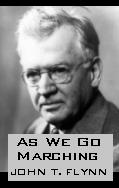
Jeffrey Tucker introduces "As We Go Marching" by John T. Flynn, available for purchase online at mises.org/store/As-We-Go-Marching-P346.aspx
Review full book on PDF
The 1930s

Consistently at all stages of his literary career, Flynn opposed militarism. He was a key advisor to the 1934 Nye Committee, which investigated the role of the so-called "merchants of death" (munitions manufacturers and bankers) in leading to U.S. entry into World War I.
By 1936, Flynn had publicly broken with Roosevelt. He was already drawing comparisons between the centralist features of the New Deal on the one hand, and Benito Mussolini's policies on the other: "We seem [he wrote] to be not a long way off from the kind of Fascism which Mussolini preached in Italy before he assumed power; and we are steadily approaching the conditions which made Fascism possible."
By 1936, Flynn had publicly broken with Roosevelt. He was already drawing comparisons between the centralist features of the New Deal on the one hand, and Benito Mussolini's policies on the other: "We seem [he wrote] to be not a long way off from the kind of Fascism which Mussolini preached in Italy before he assumed power; and we are steadily approaching the conditions which made Fascism possible."
Flynn was one of the founders of the America First Committee which opposed Roosevelt’s foreign policy. Eventually he became head of the New York City chapter, which claimed a membership of 135,000. The Committee charged that Roosevelt was using lies and deception to ensnare the United States into another war. It mounted campaigns against Lend-Lease, the Selective Service, and other initiatives by Roosevelt.
Although Flynn distanced the Committee from the claims of extremist and anti-Semitic groups, such as the National Union for Social Justice, his old pro-war leftist allies cut him off, and The New Republic pulled his regular column, "Other People’s Money." His 1940 book, Country Squire in the White House "placed [Flynn] on the White House enemies list."[2]
World War II
The America First Committee disbanded in 1941 after the Japanese attack on Pearl Harbor, and Flynn turned increasingly against New Deal liberalism, which he regarded as a "degenerate form of socialism and debased form of capitalism." In 1944 he wrote a sharp critique of the American drift toward statism: As We Go Marching. This essay warned of an unholy alliance influencing U.S. foreign policy, and included these words:
The enemy aggressor is always pursuing a course of larceny, murder, rapine and barbarism. We are always moving forward with high mission, a destiny imposed by the Deity to regenerate our victims, while incidentally capturing their markets; to civilise savage and senile and paranoid peoples, while blundering accidentally into their oil wells.[3]Four years later, Flynn followed As We Go Marching with another and rather similar book, The Roosevelt Myth. By 1950 he was describing himself as a liberal in the classical liberal tradition of small government and free markets.